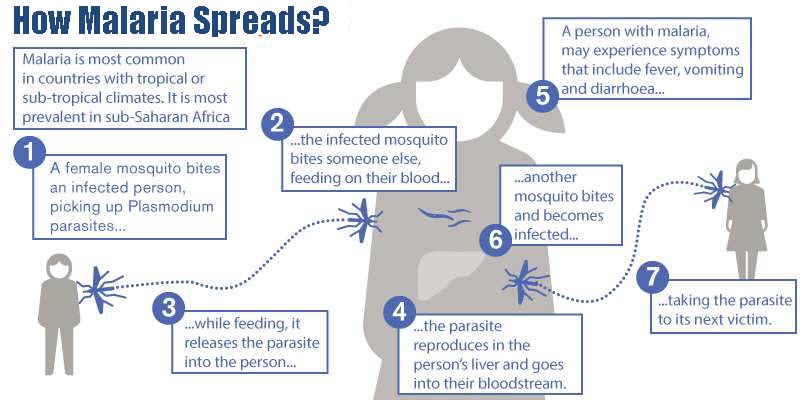
Malaria is a mosquito-borne disease caused by a parasite. People with malaria often experience fever, chills, and flu-like illnesses. Left untreated, they may develop severe complications and die. In 2020 an estimated 241 million cases of malaria occurred worldwide and 627,000 people died, mostly children in sub-Saharan Africa. About 2,000 cases of malaria are diagnosed in the United States each year. The vast majority of cases in the United States are in travelers and immigrants returning from countries where malaria transmission occurs, many from sub-Saharan Africa and South Asia.

Malaria Is Preventable, Treatable, and Curable
Individuals can protect themselves against malaria by wearing protective clothing and using insect repellents and bed nets. According to the WHO, field trials indicate that insecticide-treated bed nets and curtains have the potential to reduce childhood mortality by 15 percent to 35 percent. Despite their proven efficacy, fewer than 2 percent of African children sleep under protective bed nets. Drugs are used to prevent (chemoprophylaxis) and treat infection in individuals.
Global Actions to Roll Back Malaria
In 1998, the WHO, the United Nations Development Programme (UNDP), UNICEF, and the World Bank initiated the global Roll Back Malaria (RBM) partnership. By 2010, this coalition of governments, development agencies, commercial organizations, research groups, and the media seeks to cut by half the global incidence of malaria by focusing on:
- Early diagnosis and prompt treatment;
- Insecticide-treated bed nets and vector control;
- Prevention and response to epidemics.
Topical Activity
Work in pairs and practice the following dialogue. First, one student plays the
role of Saleh and the other of Bachal. Then reverse the roles and repeat the
dialogue.
Saleh: Where is Ali?
Bachal: He has malaria. He has not come.
Saleh: Oh! I’m sorry to hear this.
Bachal: Malaria has become a big problem in our area. We must do something about this.
Saleh: Let us start a fight against malaria.
Bachal: How can we do that?
Saleh: We can start educating all the children in our school.
Bachal: Yes. We can tell them to spray kerosene on stagnant water.
Saleh: We can also tell them to try and cover themselves with a thin cloth or net while sleeping
Bachal: Let us go to our Union Council member and request him to order spray in our area regularly to kill all the mosquitoes.
Practicing Activity
Ana: Hi! I’m Ana. Welcome to What to Say!
Do you know what to say when you need to deal with a problem? Listen out for useful language for dealing with a problem. Then, we’ll practice saying the new phrases – after this.
Vanya: Yuna!
Yuna: Oh, morning!
Vanya: I’ve got a bit of a problem.
Yuna: What’s wrong?
Vanya: Can we talk in private?
Yuna: Of course.
Yuna: Right, so, what’s the matter?
Vanya: Well, I’ve made a mistake. A big mistake.
Yuna: OK. I’m sure we can work it out.
Vanya: It was such a silly thing to do!
Yuna: I’m getting worried now. What’s going on here?
Vanya: OK. It was late last night and I was tired. I wasn’t concentrating and I accidentally used my company credit card instead of my own to buy something!
Yuna: Don’t worry, these things happen. There’s a procedure to deal with this. How much did you spend?
Vanya: It was quite expensive.
Yuna: How expensive?
Vanya: It was very expensive.
Yuna: Vanya, how expensive?
Vanya: £3,782 … and 56 pence.
Yuna: What? You spent £3,782?!
Vanya: … and 56 pence.
Yuna: What was it? Vanya?
Vanya: Just a weekend break! I just like a really nice hotel!
Yuna: OK, I see. Thanks for letting me know.
Vanya: Ah! I feel so much better now I’ve told you. Please don’t tell Noelia.
Yuna: Oh, I’m definitely going to tell her!
Noelia: Hi!
Vanya: Hi!
Ana: Hello again! Wow, that’s a lot of money for a weekend break. So, did you notice the useful phrases used for dealing with a problem? Listen to me and then repeat.
What’s wrong?
I’ve got a bit of a problem.
Could we talk in private?
What’s the matter?
I’ve made a mistake.
I’m sure we can work it out.
Don’t worry, these things happen.
Thanks for letting me know.
I feel so much better now I’ve told you.
Ana: Try and use some of these phrases the next time you need to deal with a problem in English. Bye for now!